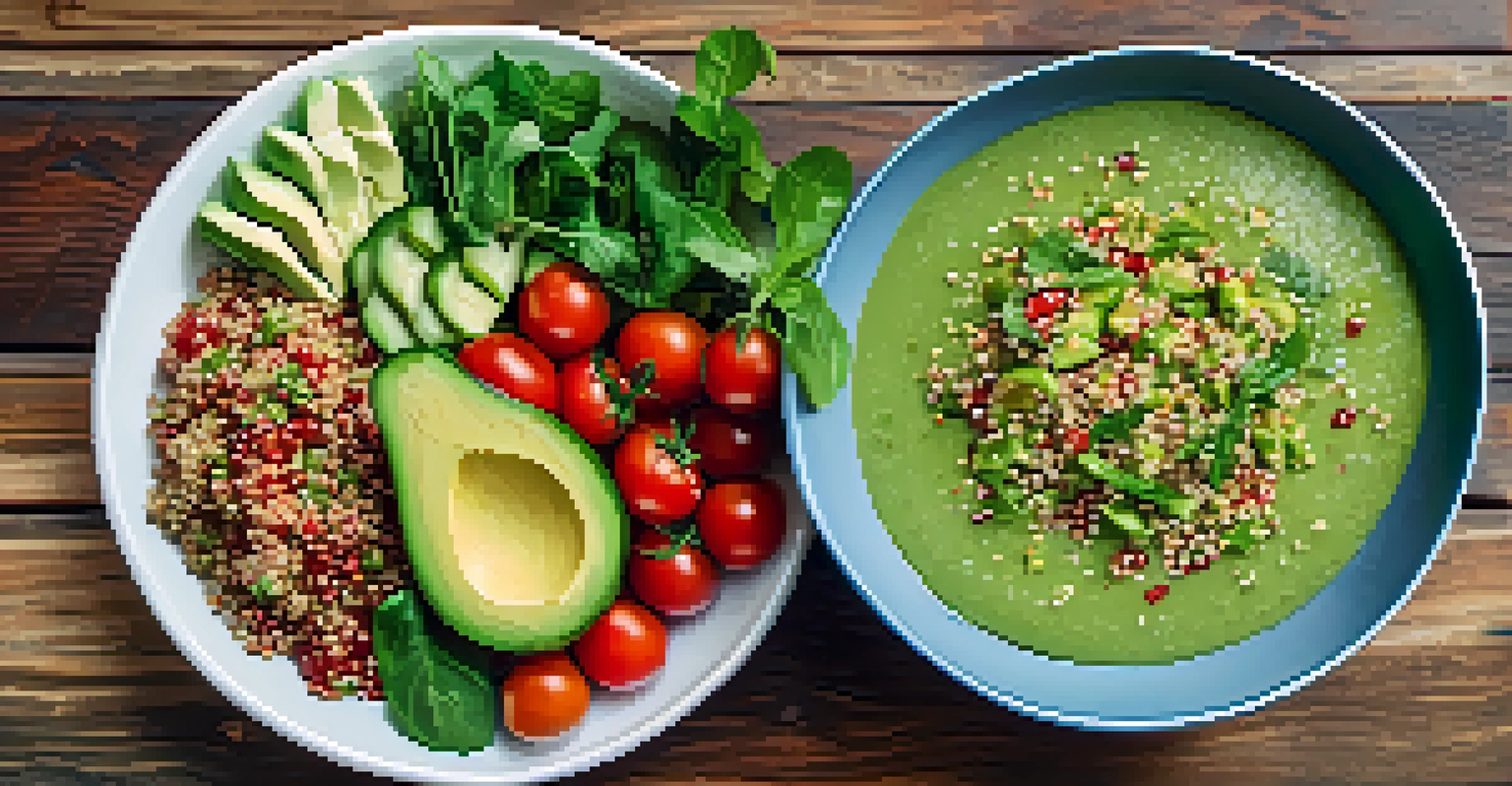Understanding the Cardiovascular Benefits of a Vegan Diet

What is a Vegan Diet and Its Core Principles?
A vegan diet excludes all animal products, focusing solely on plant-based foods. This means no meat, dairy, or eggs, and it often emphasizes fruits, vegetables, grains, nuts, and seeds. Adopting a vegan lifestyle is not just about food; it's a commitment to reducing harm to animals and the environment.
Eating a plant-based diet is not just about what you eat, it's about how you live.
Many people are drawn to veganism for various reasons, including ethical concerns, environmental sustainability, and health benefits. By choosing whole foods over processed items, vegans typically consume a diet rich in vitamins, minerals, and fiber. This plant-centric approach is foundational to understanding its impact on cardiovascular health.
Transitioning to a vegan diet can be an exciting journey, filled with delicious discoveries. With the right planning, it can provide all the essential nutrients needed for a healthy heart. The connection between diet and heart health is a growing area of research and one that highlights the benefits of embracing plant-based eating.
The Role of Fiber in Heart Health
Fiber is a superstar nutrient found abundantly in fruits, vegetables, and whole grains. It plays a crucial role in lowering cholesterol levels and improving heart health. A vegan diet typically includes a high intake of fiber, which can help reduce the risk of heart disease.

When you consume fiber, it helps to remove excess cholesterol from the bloodstream, acting almost like a sponge. This helps to maintain healthy blood pressure levels and supports overall cardiovascular function. Moreover, fiber-rich foods are generally lower in calories, making it easier to maintain a healthy weight.
Vegan Diet Boosts Heart Health
A vegan diet rich in fruits, vegetables, and whole grains can significantly lower cholesterol levels and improve cardiovascular health.
Incorporating a variety of fiber-rich foods into your meals can also enhance gut health. A happy gut contributes to better nutrient absorption and overall wellness, which indirectly supports heart health. This interconnectedness highlights why a vegan diet can be a powerful ally for anyone looking to improve their cardiovascular health.
Antioxidants: Nature’s Heart Protectors
Antioxidants are compounds that help neutralize harmful free radicals in the body. Plant-based foods, particularly fruits and vegetables, are rich in antioxidants, which can protect the heart from damage. A diet high in antioxidants is linked to a reduced risk of chronic diseases, including heart-related issues.
The food you eat can be either the safest and most powerful form of medicine or the slowest form of poison.
Common antioxidant-rich foods include berries, leafy greens, and nuts. These foods not only provide essential nutrients but also support the body's defense against oxidative stress. By choosing a variety of colorful fruits and vegetables, you can boost your antioxidant intake and support your heart health.
The beauty of a vegan diet is its diversity, allowing you to explore different flavors and textures while reaping these health benefits. For example, a bowl of mixed berries not only tastes great but also provides a powerhouse of nutrients that can help keep your heart healthy. Making conscious choices about food can lead to a significant impact on your cardiovascular system.
Healthy Fats: The Good, the Bad, and the Vegan
Contrary to popular belief, not all fats are created equal. Healthy fats, such as those found in avocados, nuts, and seeds, are vital for heart health. A vegan diet allows for the inclusion of these beneficial fats, which can help lower bad cholesterol levels and reduce inflammation.
In contrast, saturated and trans fats, often found in animal products, can raise cholesterol levels and increase heart disease risk. By focusing on plant-based sources of fat, you can nourish your body without the harmful effects of unhealthy fats. This shift can lead to improved cardiovascular health over time.
Fiber's Role in Heart Wellness
High fiber intake from plant-based foods helps reduce cholesterol and supports overall heart function.
Incorporating healthy fats into your vegan meals can be both satisfying and beneficial. For instance, a sprinkle of chia seeds on your smoothie or a handful of walnuts in your salad can provide those essential fatty acids your body craves. The key is balance and making informed choices to support your heart.
The Importance of Vitamins and Minerals
A well-rounded vegan diet is rich in essential vitamins and minerals that support heart health. Nutrients like potassium, magnesium, and vitamin K are crucial for maintaining healthy blood pressure and preventing cardiovascular disease. These nutrients are abundant in leafy greens, legumes, and whole grains.
Vitamin B12 is an exception, as it's primarily found in animal products. Vegans should consider fortified foods or supplements to ensure adequate intake. This is a great example of how planning is essential in a vegan diet to cover all nutritional bases.
By focusing on a variety of whole foods, vegans can easily meet their vitamin and mineral needs. Regularly incorporating foods like spinach, bananas, and quinoa not only enhances your meals but also supports your heart health. A diverse diet is key to ensuring you get all the nutrients your body needs.
Vegan Diet and Blood Pressure Regulation
Research suggests that a vegan diet may help lower blood pressure due to its high content of fruits and vegetables. These foods are rich in potassium, which can help manage sodium levels and promote healthy blood pressure. This is particularly important as high blood pressure is a significant risk factor for heart disease.
The combination of nutrient-dense plant foods and low saturated fat intake contributes to this effect. By reducing reliance on processed foods and focusing on whole, plant-based options, many people experience improvements in their blood pressure readings. It's a natural way to support cardiovascular health.
Nutrients Essential for Cardio Care
Vegan diets provide essential vitamins and minerals, such as potassium and magnesium, crucial for maintaining healthy blood pressure.
Incorporating foods like sweet potatoes, beans, and bananas into your daily meals can make a noticeable difference. Simple changes, such as swapping out a meat-heavy meal for a hearty vegetable stew, can not only be delicious but also beneficial for your heart. Every small step counts on the journey to better heart health.
Long-Term Health Benefits of a Vegan Diet
Adopting a vegan diet can lead to long-term health benefits, particularly concerning heart health. Studies have shown that vegans often experience lower cholesterol levels, reduced blood pressure, and a lower risk of heart disease compared to those who consume animal products. This makes plant-based eating a compelling option for maintaining cardiovascular wellness.
Beyond direct heart health benefits, a vegan diet can lead to improved overall health, including weight management and decreased risk of other chronic diseases. By focusing on nutrient-dense foods, individuals can cultivate better health habits that last a lifetime. This holistic approach reinforces the interconnectedness of diet and health.

As more people embrace a vegan lifestyle, the evidence supporting its health benefits continues to grow. The long-term rewards are not just about living longer but living healthier. Embracing veganism can be a transformative experience, benefiting both your heart and overall well-being.